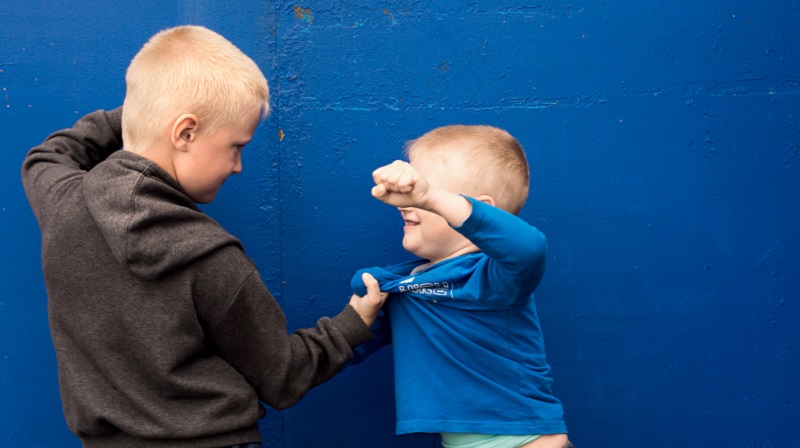Aggressive Behavior in Children
Are you worried about aggressive behavior in children?
Aggressive behaviors, such as the occasional tantrum or meltdown are common in young children. They become of concern, especially when exhibited repeatedly by older children, who regularly show problems controlling their emotions and behaviors.
When children exhibit high levels of aggression their parents and teachers worry. What is the problem? Why is the child showing concerning levels of aggressive behaviors? What is contributing to and maintaining these aggressive behaviors? And what can they do to help?

Aggressive children may be argumentative and verbally aggressive. They may have difficulty controlling their temper and are easily upset and annoyed by others. They may be defiant and may appear angry and resentful.They may bully other children. Their aggressive behaviors can contribute to family stress, disrupt lessons in school and hurt, intimidate and frighten others.
During
episodes of aggression and following them, it may be hard to calm and
sooth the young person and assist him in regulating his emotions. Aggressive behaviors may be impulsive ( e.g., a strong reaction to a trigger), or premeditated (planned acts of violence). Impulsive
aggressive acts are associated with poor emotional and/or behavioral
control. Premeditated acts of violence are the opposite. Those who
commit premeditated acts of violence appear controlled, they exhibit a
low heart rate, poor skin tone and are described as cold and
lacking in empathy.
Aggressive behaviors in children are associated with Oppositional Defiant and Conduct Disorders. Without help, aggressive children are at risk of developing these disorders. As their problems increase, their aggressive behaviors may threaten the safety of other children, and/or adults. Should their aggressive behaviors escalate to this level, some of these children may be suspended from school. The protection of other children and their teachers is the prime concern when this occurs.
Aggressive Behaviors in children are
also associated with a range of other mental health concerns, including
post traumatic stress and brain injuries and/or dysfunction.
Some children exhibit aggressive behaviors that are less extreme or problematic, but worrisome nonetheless. They may slap or poke other children or pinch them. Some children throw small objects or bang and break things when they are angry and upset. Others have temper tantrums and kick or scream.
Aggressive behavior in children can manifest as verbal aggression, such as calling other children names, threatening or teasing them. Or they may psychologically victimize other children by excluding them and spreading rumours about them.
Aggressive children need help to develop healthy coping strategies to control their behaviors and manage anger and conflict, and other distressing feelings and situations. They need to learn alternative ways to solve problems. They are also likely to benefit from strategies to help calm and sooth their nervous systems, so they are not so easily triggered and thrown into the "fight " response when they feel threatened.
Aggressive Behavior in
Children
Causes & Risk Factors
Aggressive behavior in children is associated with
distress, frustration and upset in the young person. Multiple factors typically interconnect and contribute to the young person's frustration upset and distress. These may include problems learning and succeeding at
school, social and relationship problems and problems within the family,
or multiple adverse experiences of varying types present in the family or community or at school. Adverse Childhood Experiences (ACEs) are associated with aggressive behavior in children, and can be a major contributing factor. This occurs, in part, because of their association with post traumatic stress and related symptoms. Post traumatic symptoms, whether they are associated with ongoing, chronic forms of trauma, like ACEs, or a single acute event like a motor vehicle accident are also associated with aggressive behavior in children.

An Assessment Can Help
Dr. O'Connor provides in depth, comprehensive school neurpsychological assessments to get to "the root of the problem," in this case, what is contributing to and maintaining the aggressive behaviors the young person exhibits.
The school neuropsychological assessment provides a detailed, comprehensive understanding of the problem. It leads to diagnoses that apply to the problem and provides the foundation required to support evidence based interventions to address it. Without a comprehensive assessment to provide this understanding and what is contributing to and maintaining the aggressive behaviors, it will be difficult to address.
The assessment becomes part of the solution; its findings lead to evidence based interventions to address aggressive behavior in children.
Interventions & Treatment Options
Aggressive behavior in children extends beyond a reaction to environmental triggers, to include how the aggressive individual interprets, perceives and processes the event. These cognitive processes contribute to the onset of aggressive behaviors. We need to consider them when developing interventions and treatment strategies. Children, for example, who exhibit atypical levels of aggressive behaviors, may focus more on aggressive stimuli, and over attribute hostile intent to that stimuli, than children less prone to aggressive behaviors. They may also show poorer social problem solving skills and behavorial self-awareness than their less aggressive peers.
Evidence based interventions and treatment address the above concerns when applicable, and also include parent management training, and cognitive behavioral therapy, the latter often in the form of problem solving skills training. The latter two interventions are considered most effective when used together across a wide variety of situations at home, at school and with peers. Consider trauma informed therapy when trauma primed triggers are a factor in the young person's aggressive behaviors.
Children Who Lack Empathy
If the child lacks empathy or concern for the people he hurts or if he hurts and is cruel to animals seek professional help. Similarly if your child’s aggression appears extreme and out of control at home or at school, or both, professional support is strongly recommended.
Evidence based programs to help prevent aggressive behaviors in children have also been implemented.